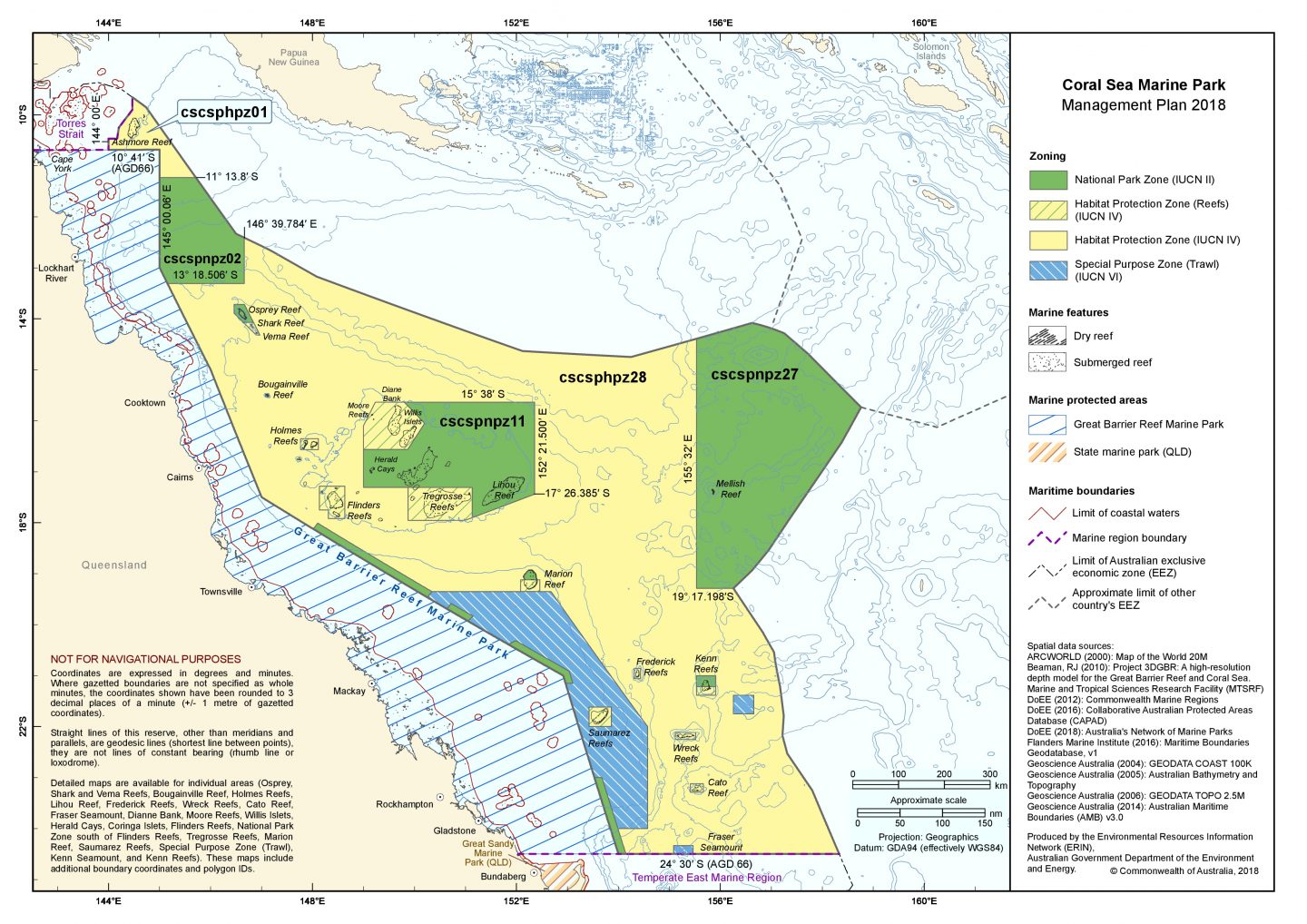Achieving a balance of interests in the Coral Sea

The introduction of national marine parks is a reality facing commercial fishing. The normal course of events will be a loss of fishing grounds, no take zones and limited access for some types of commercial fishing.
You might think that Coral Sea zoning plan, locking up almost one million square kilometre to one or more forms of commercial fishing, demonstrates a positive outcome for the environment. Conservation groups are leading the charge making claims that the Coral Sea plan amongst others ignores science, the ‘voice’ of Australians and the views of local communities. Mr Darren Kindleysides, CEO of the Australian Marine Conservation Society (AMCS) recently stated, ‘The Turnbull Government’s plans ignore the decades of science, the advice of its own independent review, the wishes of local communities, and the voice of hundreds of thousands of Australians who have been consulted over the years’.
Australia’s marine parks network means loss of protection unequalled in Australian history
Who’s voice has been ignored? A segment of the community that places a total focus on the environment over the reality that: (1) the marine resource is a national resource, (2) it is a renewable resource from a commercial fishing perspective and (3) the Coral Sea has tourism and recreational fishing values. The plans have been developed adopting a range of scientific, community and industry views. A plan that focusses on multi-use marine parks is not a failed endeavour but one that recognises that marine parks should be managed with multiple stakeholders interests considered (including, oh so shockingly, commercial fishing). A balanced, triple bottom line approach is never perfect – adjustment packages will be required for some commercial fishing businesses but overall a sensible balance have been achieved.
The ‘outrage machine’ that has been created by conservation groups is not new and perhaps organisations like the Pew Charitable Trusts need to move away from interfering in Australian policy debates. Australian base conservation groups should be focussed on the key threats facing our marine environment including coastal development, modification of catchments, pollution, introduced organisms from shipping and the aquarium trade, modification of tributaries, climate change and ocean acidification. Restricting or outright banning of commercial fishing is a signal that environmental organisations are not achieving wins on key threats and so my industry becomes a target to create the illusion that banning commercial fishing will improve the health of aquatic ecosystems.
Attacking commercial fishing, increasing the stress commercial fishing families are under and limiting the access of Australian and international consumers to wild caught seafood is not acceptable. Denying seafood to consumers is not acceptable and a philosophical approach from conservationist’s that fishing is a key environmental threat is being exposed for the lie that it is.
Seafood Industry Media Releases – 21 March 2018
Seafood Industry Australia
Seafood Industry Australia welcomes Commonwealth Marine Parks Management Plans
Queensland Seafood Industry Association
Coral Sea Zoning Plan – Striking a Balance
Western Australian Fishing Industry Council
Marine Reserve Network Proves a Mixed Bag for the WA Fishing Industry
Northern Territory Seafood Council
Genuine efforts demonstrated in balancing livelihoods of professional fishers
Marine park plan links noted below:
- Coral Sea Marine Park Network Management Plan 2018
- North-west Marine Park Network Management Plan 2018
- Temperate East Marine Parks Network Management Plan 2018
- South-west Marine Parks Network Management Plans 2018
- North Marine Parks Network Management Plans 2018
Author: Eric Perez, CEO – Queensland Seafood Industry Association
Image Credit: Coral Sea Maps – Parks Australia
The content of this post is provided for information purposes only and unless otherwise stated is not formal QSIA policy. The information on these posts are provided on the basis that all persons accessing the information undertake their own responsibility for assessing the relevance and accuracy of it.

